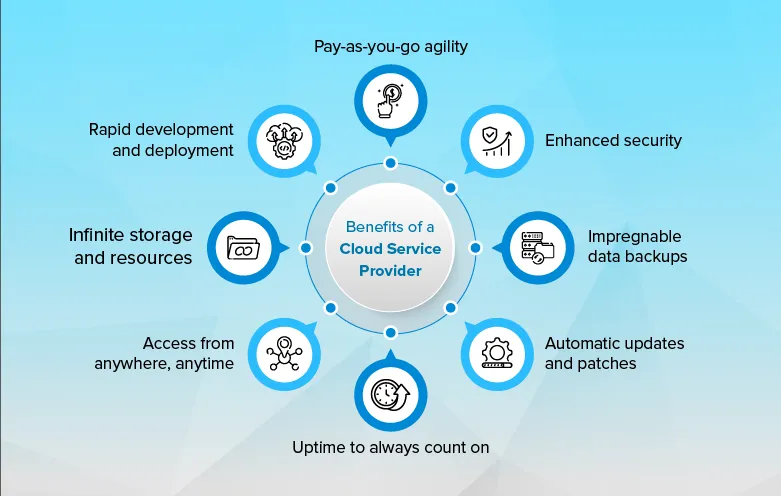AWS vs Azure vs GCP: How to Choose the Best Option for Your Needs
Unsure which cloud platform (AWS, Azure, GCP) is best for your business? This guide dives deep into each provider's strengths & weaknesses to help you make an informed decision.
Published Apr 16, 2024
What is a cloud service provider?
Key features of cloud service providers
Cloud strategy and assessment workshop
Top 3 cloud service providers: Feature-wise comparison
Cloud services worldwide adoption
Which cloud service provider is suitable for your business?
Let Us Find Your Business’s Perfect Fit
The world of public cloud platforms buzzes with comparisons, constantly ranking giants like AWS, Azure, and GCP in a race for “best in show.” However, when it comes to cloud security, the reality is far more nuanced.
Each platform offers a unique toolkit, with strengths and potential weaknesses specific to its design and architecture. So, how does a business leader make an informed decision about which platform best secures their data and infrastructure? This is where cloud consulting services can be invaluable.
This article dives deeper than the usual comparisons, offering a clear and objective analysis of the security features each provider brings to the table. By understanding these differences, businesses will be empowered to make a choice that aligns with their specific business needs and risk tolerance.
Imagine having access to an ever-expanding pool of computing resources, readily available and scalable to needs, without the burden of maintaining hardware infrastructure. That’s the power of cloud service providers (CSPs). CSPs act as an on-demand tech partners, offering a combination of technology, infrastructure, and expertise through the magic of cloud computing. They own and manage vast data centers around the globe, equipped with the latest servers, storage, and cooling systems. Business leaders simply pay for the resources they use, making it a cost-effective solution for businesses and individuals alike.
Here’s what businesses can get by leveraging a cloud service provider:
- On-demand access: Resources are readily available, eliminating the need for upfront investments in hardware and software.
- Scalability: Easily adjust resource usage up or down as the needs evolve.
- Global reach: Access data centers worldwide for optimal performance and data residency.
- Cost-efficiency: Pay only for what has been used, eliminating idle resource costs.
- Expertise: Benefit from the provider’s deep knowledge and experience in managing cloud infrastructure
The business landscape is a whirlwind of constant change, with competition and evolving customer demands forcing companies to adapt and innovate faster than ever. Cloud computing has emerged as a game-changer, empowering organizations to achieve agility, cost efficiency, and security. Let’s delve into the key benefits of choosing the right cloud service provider that help you streamline the transformative potential of the cloud:

1. Pay-as-you-go agility
Cloud service providers (CSPs) offer a “pay-as-you-go” model, eliminating the need for expensive hardware and software purchases. You only pay for the resources you use, allowing for significant cost savings. Additionally, cloud eliminates the need for a dedicated IT team, further reducing operational expenses.
2. Enhanced security
Security breaches are a constant concern, but with a CSP, businesses can shift the burden of keeping the data safe. Cloud providers have state-of-the-art security infrastructure and expertise, constantly vigilant against evolving threats. Studies show that businesses often experience improved security after migrating to the cloud, with many finding it easier to comply with stringent data privacy regulations.
3. Impregnable data backups
Imagine a natural disaster or technical malfunction crippling the IT infrastructure. Cloud eliminates this fear. Providers offer redundant backups across multiple regions, ensuring the data remains safe even in the face of unforeseen events. This guarantees business continuity and prevents catastrophic data loss.
4. Automatic updates and patches
Software updates and security patches are crucial, but they can be time-consuming and resource-intensive. Cloud takes this burden off the shoulders. CSPs handle all updates and patches automatically, freeing the IT team to focus on strategic initiatives that drive growth.
5. Uptime to always count on
Downtime is costly and disruptive. Cloud providers boast world-class infrastructure and expert teams dedicated to ensuring maximum uptime and performance. This translates to enhanced business continuity, improved customer experience, and a competitive edge over traditional setups.
6. Access from anywhere, anytime
The modern workforce is increasingly mobile and geographically dispersed. Cloud computing empowers the team to access data and applications seamlessly from any device, anywhere in the world. This flexibility fosters collaboration, boosts productivity, and enables remote work models with ease.
7. Infinite storage and resources
On-premise storage has limitations, but the cloud knows no bounds. CSPs offer virtually unlimited storage capacity, allowing businesses to scale the resources up or down effortlessly as the business grows. This eliminates the risk of running out of space and ensures that businesses have the resources they need to thrive.
8. Rapid development and deployment
Cloud platforms like Platform as a Service (PaaS) and serverless computing provide pre-built tools and services that streamline development and deployment cycles. This enables businesses to bring ideas to life faster, innovate more rapidly, and gain a competitive advantage in the marketplace.

The adoption of cloud-based infrastructure by enterprises is increasing greatly. However, a lot of enterprises are still reluctant to adopt a cloud strategy due to lack of skills or knowledge.
| Features | AWS | Azure | GCP |
|---|---|---|---|
| Market Position | Established market leader | Strong hybrid cloud focus, enterprise integration | Big data and machine learning leader, strong open-source community |
| Stability | High transfer stability, mature infrastructure | High transfer stability, global network reach | High transfer stability, focus on containerization (Kubernetes) |
| Integration | Extensive partner network, diverse software integration options | Easy with Microsoft tools & software, strong hybrid cloud capabilities | Easy with GCP services (Compute Engine, Kubernetes, App Engine), growing partner network |
| Data Availability | Globally distributed data centers, extensive options | 78+ regions, more than any provider, high availability zones (106) | Data centers strategically located, focus on user control and data sovereignty |
| Enterprise Focus | Wide range of enterprise-grade services and support | Profound knowledge of enterprise needs, security and compliance focus | Growing enterprise adoption, strong focus on large-scale deployments |
| Resources | Well-detailed documentation, extensive training and certification programs | Well-detailed documentation, strong community support, developer-friendly tools | Well-detailed documentation, strong open-source support, focus on innovation and emerging technologies |
| Pricing Model | Pay-as-you-go, Reserved Instances, Savings Plans (complex pricing structure) | Pay-as-you-go, Reserved Instances, Azure Hybrid Benefit (flexible pricing options) | Pay-as-you-go, Committed Use Discounts, Sustained Use Discounts (transparent pricing structure) |
| Security | Comprehensive security offerings, compliance certifications | Strong focus on security and compliance, advanced threat protection | Emphasis on data security and privacy, zero-trust approach |
| Innovation | Broad range of services, continuous development of new features | Focus on hybrid cloud and enterprise integration, commitment to open-source technologies | Strong focus on AI and machine learning, innovative solutions for specific industries |
| Community & Support | Largest community and most resources, established user forums and support channels | Growing community and good documentation, strong partnership network | Growing community, active developer forums, focus on open-source collaboration |

Source: Statista
These are some of the factors that will help you decide which suits your business best.
AWS:
- Strengths: Enormous range of services, unmatched scalability, mature tooling and vast community.
- Ideal for: Businesses needing a one-stop shop for cloud solutions, from storage and databases to mobile development and security. Enterprises looking for highly scalable infrastructure will find AWS particularly useful.
Azure:
- Strengths: Tight integration with other Microsoft products (like Office 365), strong focus on hybrid cloud solutions, robust security features.
- Ideal for: Businesses already invested in the Microsoft ecosystem or with a hybrid cloud strategy. Companies with stringent security requirements can leverage Azure’s advanced security features.
GCP:
- Strengths: Competitive pricing, cutting-edge AI and machine learning tools, expertise in big data analytics.
- Ideal for: Businesses prioritizing cost-efficiency and those heavily invested in data analytics and machine learning. Startups and tech companies can benefit from GCP’s innovative AI/ML tools.
The “Big Three” cloud providers – AWS, Azure, and GCP – offer a vast array of benefits, making it challenging to choose just one. Each platform excels in specific areas, and the right choice depends on your unique needs and priorities. Here’s a glimpse into their key strengths:
- Market leader: With the largest market share, AWS boasts a mature and extensive range of services, offering unparalleled breadth and depth.
- Scalability and reliability: Proven track record of scalability and reliability, making it suitable for even the most demanding workloads.
- Extensive partner network: A vast ecosystem of partners and tools, allowing for easy integration with existing infrastructure and workflows.
Microsoft Azure:
- Hybrid cloud focus: Excels in hybrid cloud scenarios, seamlessly integrating with on-premises infrastructure for a smooth transition to the cloud.
- Enterprise-grade security: Renowned for its robust security features and compliance certifications, ideal for organizations with stringent security requirements.
- Microsoft integration: Tight integration with other Microsoft products and services, providing a familiar and cohesive experience for existing users.
Google Cloud Platform:
- Cost-effectiveness: Often seen as the most cost-effective option, with transparent pricing structures and competitive discounts for sustained use.
- Big data & machine learning: A frontrunner in big data and machine learning, offering advanced tools and services like TensorFlow and BigQuery.
- Open-source friendly: Strong commitment to open-source technologies and active participation in the open-source community.
The cloud is a dynamic ecosystem brimming with potential. Choosing the right cloud service provider and navigating its intricacies can feel like a challenge – and that’s where Softweb Solutions can step in for businesses.
We have proven expertise and we go beyond the three to help business leaders realize what they need to succeed. We don’t believe in one-size-fits-all solutions. Our cloud consultants meticulously analyze the business goals, infrastructure, and budget to create a customized roadmap for cloud adoption.
Originally published at softwebsolutions.com on March 28, 2024.
